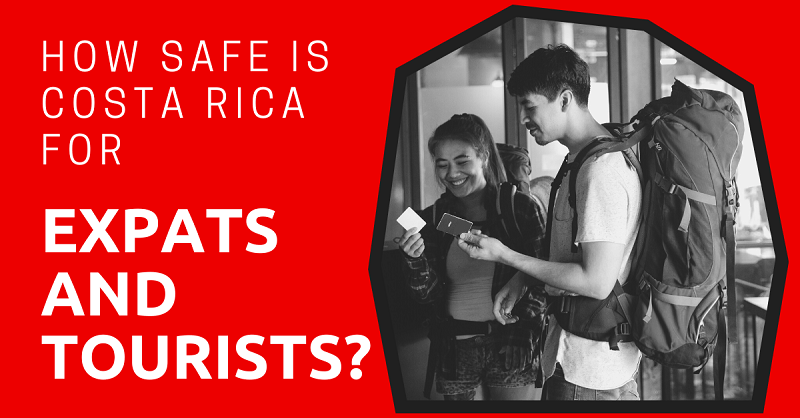
Whether you’re going on a holiday in Costa Rica or planning to move there, safety is an important concern. According to the Global Peace Index (GPI), Costa Rica currently ranks 39th in the world and is the safest country in Central America.
Of course, this statistic doesn’t mean a lot without digging down into the stats about safety. In this article, we’ll cover important information about safety in Costa Rica, specifically looking at the types of crime that most commonly relate to travelers and expats.
This article will take approximately 11 minutes to read. Don't have the time right now? No worries. You can email the ad-free version of the article to yourself and read it later!
Disclaimer: This article may include links to products or services offered by ExpatDen’s partners, which give us commissions when you click on them. Although this may influence how they appear in the text, we only recommend solutions that we would use in your situation. Read more in our Advertising Disclosure.
Contents
Is Costa Rica Safer than the USA?
In the aforementioned Global Peace Index ranking, Costa Rica actually ranks far higher than the USA; Costa Rica currently sits at 38th, whereas the USA is 131th, while Mexico is at 136.
However, Costa Rica ranks lower than Canada and the UK, which are 11th and 37th, respectively. Panama, Costa Rica’s neighbor, sits at 68, but its other neighbor, Nicaragua, is at 123. Looking at global comparisons, Costa Rica is statistically a fairly safe country.
It’s not particularly important to go into the GPI’s methodology because it takes 23 factors into consideration when calculating its scores. However, what does matter is that several of these relate to crime rates in a country. These include:
- Level of violent crime
- Level of perceived criminality
- Ease of access to weapons in society
While these factors are important to travelers and expats, what’s arguably more important is a country’s ratings of petty crime. This includes crimes like theft, road accidents, and the like. After all, these crimes are statistically more common regardless of the country, with theft being the most common type of crime experienced by tourists and travelers.
For the rest of this article, these are the types of crime that we’ll focus on. The information is designed to give you a realistic expectation of safety levels in Costa Rica, so you know what to expect if you take a short trip or move there permanently.
Natural Disasters
Natural disasters aren’t super common in Costa Rica, but there are a few things to be aware of. The country is close to the Ring of Fire, one of the most earthquake-prone areas in the world. There are also six active volcanoes in the country.
Earthquakes and floods are the two most common natural disasters to take into consideration when visiting the country. Since 1980, the country has experienced 18 severe floods and 11 major earthquakes. The most recent earthquake was in 2017, which shows that, although earthquakes do happen, they’re quite infrequent.
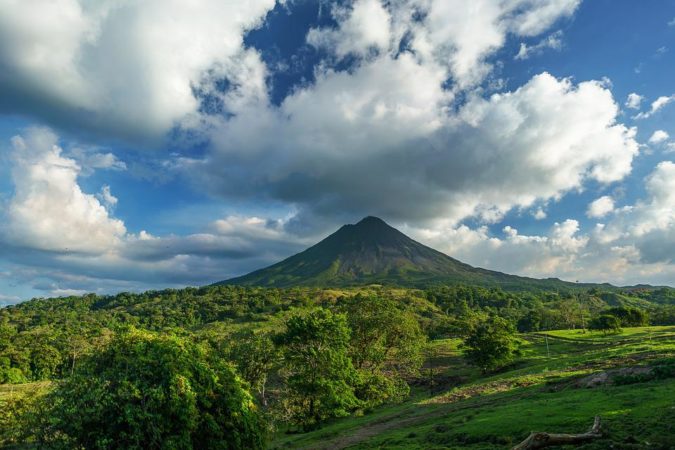
The easiest way to avoid these as a traveler is to go during the dry season (December–April). Doing so decreases your risk of experiencing flooding disasters. That said, it helps to have a plan in place regardless of when you choose to go. Planning can simply mean knowing where your country’s embassy is located or what your accommodation’s safety measures are.
For expats looking to settle down, natural disasters shouldn’t be a major concern. The only thing that happens with any regularity is flooding, which is easy enough to avoid. It mainly happens in the north of the country or (obviously) around major rivers. Volcanic eruptions and earthquakes aren’t common enough to dictate where in Costa Rica you should live.
Pickpocketing
According to the US Department of State, petty crime such as pickpocketing is the predominant threat to tourists in Costa Rica. That said, the website ranks the country at 2 out of 4, although it was only recently downgraded from rank 1 at the beginning of the pandemic. This should give you a clearer indication that Costa Rica is a fairly safe country.
Numbeo ranks Costa Rica’s rate of theft, which it classifies as mugging and theft from home and vehicles, as moderate. Pickpocketing, which falls under this category, is deemed a relatively rare crime simply because it’s more difficult to perform. Bag snatching is arguably more common, but, again, this isn’t a common occurrence outside of major cities.
Provided you take appropriate precautions, you can decrease your risk. Here are some steps you can take:
- Don’t keep all your money on you.
- If you have a wallet or purse, keep it in a buttoned pocket.
- Consider using a lanyard or chain to secure a wallet to your belt or around your neck.
- Use a belt bag rather than a rucksack.
- Remain vigilant in crowded areas.
- Consider securing zips with a padlock or zip tie.
The most helpful tip to prevent getting pickpocketed is to simply keep an eye out for suspicious circumstances. Tourists are usually seen as easy targets, but as long as you keep your bag with you at all times, there’s very little risk of getting pickpocketed.
Theft
Now, theft is a slightly different story. By theft, we mean belongings taken from cars, off the beach, or other public places rather than removed from your person. That said, we could also include complete bag theft here as opposed to things being stolen from a bag.
Numbeo reports that worries about theft from cars is high. This is partly because in Costa Rica there are a lot of older cars, many of which aren’t equipped with modern alarm and central locking systems.
Theft of unattended belongings is probably the biggest concern for travelers. Leaving property on the beach while swimming is one of the more common sources of theft among tourists, but this is fairly easy to avoid.
The US Overseas Security Advisory Council, or OSAC, recommends practicing good situational awareness with your belongings, particularly travel documents. Keep things like passports locked in your hotel room, and make a photocopy of all relevant pages just to be safe.
When out and about, be aware of crowded areas and tourist hotspots, as these are common sites for theft. Also, if you decide to go swimming, don’t leave your stuff unattended on the beach. Consider buying a waterproof rucksack, or at the very least a waterproof phone bag, so you can take your belongings in the water.
Although the theft rate in Costa Rica is moderate, its score isn’t far off from Mexico’s. It’s not particularly difficult to avoid theft in the country, providing you practice good awareness and security. Follow the above tips on how to avoid getting pickpocketed to reduce the risk of having your belongings stolen.
Road Accidents
We unfortunately don’t have any clear stats for the number of road accidents that happen annually in Costa Rica. However, there are a few ways to determine this. One way is to look at the number of road fatalities per year per 100,000 population.
In 2020, it was 746, which equates to 3.7% of all deaths that year. In the USA, by comparison, there were 41,694 road fatalities in the same year, although this represented only 1.66% of total deaths.
Another factor to consider is road safety measures implemented in the country. According to the Road Safety Facility, there are numerous road safety measures in place, such as speed limit restrictions, drink driving limits, and more.
Putting these together, it’s fair to conclude that your risk of a road accident isn’t significantly higher than in other countries. What’s worth noting, though, is that cars in Costa Rica are older, meaning they don’t have the same kinds of safety features you might be used to.
Here are some tips for avoiding road accidents:
- Don’t drive a car unless you know how to drive safely.
- Use taxis or public transport when possible.
- In cities and urban areas, be vigilant as a pedestrian when crossing or walking near roads.
If you want to drive, don’t forget to get a drivers license.
Walking at Night
As with other countries, walking at night is a good metric of perceived safety in an area. In Costa Rica, Numbeo ranks safety walking alone at night as low. It’s not far off the value for Mexico and isn’t significantly lower than that of the US.
This is simply because crime is statistically more common at night. Of course, common sense is important here, so consider these tips:
- Stick in groups when walking at night.
- Avoid dark or out-of-the-way areas.
- Remain in urban centers where possible.
- If you do need to leave an urban area, do so in a licensed taxi.
Similarly, if you decide to go to the beach at night, stick to populated beaches. Plenty of companies organize different nighttime tours, so go for one of those if there’s an after-hours activity you’re interested in.
It’s also worth noting here that you should avoid walking alone in forests, either at night or during the day. This isn’t related to crime but is more about getting lost. It’s always best to hire a local guide if you plan to go somewhere remote, simply so you can find your way back.
Is Costa Rica Safe for Families?
Costa Rica is considered safe for families, both for travelers and expats. Food and drink are accessible for all ages and both urban and rural areas are fine for kids to enjoy. Of course, if you’re traveling, just use the same level of common sense as you would on any other vacation.
For those looking to live permanently in the country, there are numerous international schools. Of course, you could send your children to local schools without any fear for their safety.
There isn’t much else to say about family safety in Costa Rica. Use common sense and be careful and there won’t be any issues for you or your kids.
Safe Cities in Costa Rica
There are different ways to categorize safe cities in any country. While more populated areas usually have higher crime rates, there are also usually more police around. The opposite is true of more rural areas.
So, determining where to live or stay in Costa Rica should be influenced more by where you want to visit than crime rates.
If you want extra security in Costa Rica, you can live in a gated community.
Here are some examples of crime rates in different towns and cities across Costa Rica to give you an idea of safety levels.
San Jose
As Costa Rica’s capital, San Jose will always have the highest crime rates. It’s also the most populated location in the country. On Numbeo, crime rates in San Jose hover between moderate and high, although its overall score is only 55. Ultimately, there aren’t any major concerns about safety in San Jose, providing you use common sense and vigilance.
Tamarindo
Tamarindo is considered one of the safest areas in Costa Rica for travelers and expats. This is thanks, in part, to its high expat population, meaning crime has typically shifted away from the normal tourism-related crimes.
However, crime still exists in the area, so be sure to remain careful when out and about. People moving here shouldn’t have much problem settling down and feeling safe if they integrate into local expat communities.
Nuevo Arenal
Nuevo Arenal is a very rural town near the volcano Arenal and its associated lake. Thanks to its small population, rural location, and relative age, it’s quite a safe town. Although it might be a bit too out of the way for some tastes, Nuevo Arenal is a great choice if you want somewhere quiet and safe.
Now, on to You
Costa Rica is a generally safe country for travelers and expats alike. Although some of the stats in this article might make it sound otherwise, none are particularly worrying when compared to other countries.
The most important piece of advice I can give you is to remain aware when going around and to keep your belongings secure. Unless you’re from a country like Norway or Canada, countries with low crime rates, you shouldn’t have to worry about safety in Costa Rica more than you would in your native country.


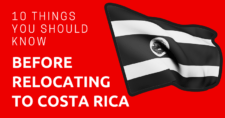
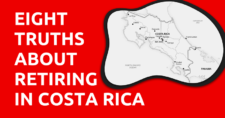


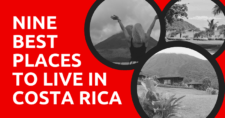
Hello and thank you for the very informative articles. Do you have any information on gun crime and ownership in Costa Rica? Can you own a gun and have one in your home or vehicle? Are concealed carry permits available? Any info would be greatly appreciated.